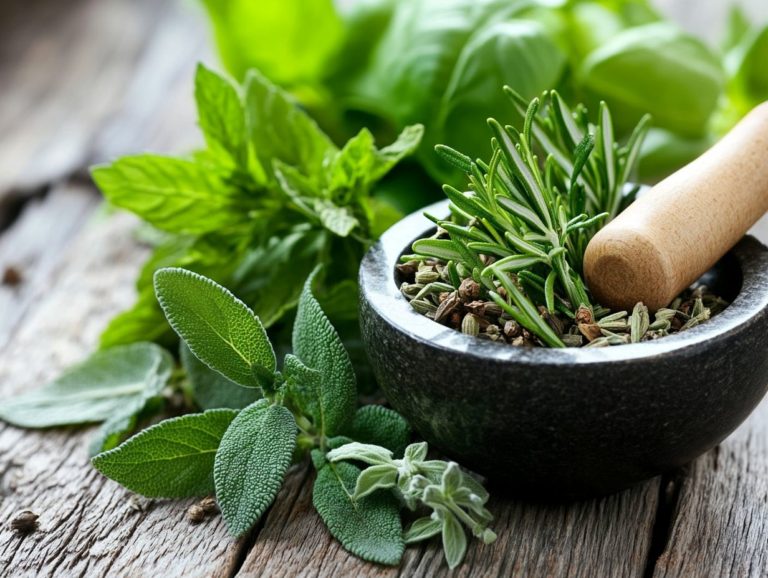Can Herbal Remedies Replace Prescription Meds?
As interest in holistic health grows, get ready to explore the potential of herbal remedies, either alongside or as alternatives to traditional prescription medications.
This article delves into what herbal remedies are, highlighting their benefits, effectiveness, and limitations. It also addresses specific conditions that could benefit from herbal treatments, emphasizing the importance of consulting with healthcare professionals.
By the end, you’ll gain a clearer understanding of how herbal remedies integrate into the broader landscape of health and wellness, empowering you to make informed choices about your well-being.
Contents
- Key Takeaways:
- Unlock the Benefits of Herbal Remedies!
- Effectiveness of Herbal Remedies
- Limitations of Herbal Remedies
- When to Consider Herbal Remedies
- Consulting with a Healthcare Professional
- Frequently Asked Questions
- Can Herbal Remedies Replace Prescription Meds?
- 1. What are herbal remedies?
- 2. Can herbal remedies be as effective as prescription medications?
- 3. Are herbal remedies safe to use?
- 4. Can herbal remedies have side effects like prescription medications?
- 5. Can herbal remedies interact with prescription medications?
- 6. Can herbal remedies fully replace prescription medications?
Key Takeaways:

- Herbal remedies offer natural and potentially beneficial ingredients for treating various health conditions.
- The effectiveness of herbal remedies may vary, and it’s important to evaluate the evidence and research before using them as a replacement for prescription medications.
- While herbal remedies can offer benefits, be aware of their limitations, potential risks, and interactions. Consult with a healthcare professional before starting them for any condition.
What are Herbal Remedies and Prescription Medications?
Herbal remedies, sourced from various parts of plants, have a rich history rooted in traditional medicine systems like Traditional Chinese Medicine and Ayurvedic Medicine. These natural alternatives often target the underlying causes of ailments, promoting overall health, in contrast to conventional medications that primarily focus on alleviating symptoms with synthetic prescription drugs.
As interest in herbal products grows due to their perceived benefits, it’s crucial to approach them with a discerning eye. For example, it’s worth exploring whether herbal remedies are effective for weight loss. Consider quality standards, potential harmful ingredients, and interactions with other medications.
The active ingredients in herbal preparations can vary dramatically in potency and effectiveness, influenced by factors such as plant variety, cultivation methods, and preparation techniques. This inconsistency underscores the importance of seeking out products that adhere to stringent quality standards, especially when considering whether herbal remedies can help with allergies.
Establishing traditional herbal registration is vital for ensuring these remedies are both safe and effective, protecting public health while honoring the rich traditions they stem from. If you are considering using these remedies during pregnancy, it’s important to know whether pregnant women can use herbal remedies. By maintaining regulatory oversight, the integrity of herbal remedies can be preserved, enabling you to make informed choices as you navigate the complexities of natural health solutions.
Unlock the Benefits of Herbal Remedies!
Herbal remedies present a wealth of health benefits, serving as natural alternatives that can enhance your overall well-being while complementing conventional medical treatments.
You might find yourself exploring herbal supplements to manage chronic conditions like diabetes and high blood pressure, drawn by their potential to tackle underlying health issues without the unwanted side effects frequently linked to pharmaceutical drugs.
Natural Ingredients and Potential Health Benefits
Natural ingredients like hawthorn berry and St. John’s Wort have gained considerable attention for their potential health benefits. They are often featured in herbal preparations to tackle issues such as high blood pressure and depression. These ingredients highlight the effectiveness of herbal remedies, especially when paired with thoughtful lifestyle changes.
Hawthorn berry stands out for its heart health benefits, known to improve circulation and reduce arterial stiffness, making it a favored choice for those aiming to enhance cardiovascular wellness. In contrast, St. John’s Wort is frequently recommended for mild to moderate depression, serving as a natural mood stabilizer.
When considering the incorporation of these herbal components into your routine, it’s essential to prioritize quality and safety. Sourcing high-grade products can greatly impact their effectiveness. Consulting with healthcare professionals before starting any herbal regimen is a wise step, ensuring a safe and beneficial integration of these herbal remedies into your overall health plan.
Take charge of your health consult with a healthcare provider before trying herbal remedies!
Effectiveness of Herbal Remedies
The effectiveness of herbal remedies is widely researched. Studies show that well-prepared herbal products can effectively address various health concerns.
Evaluating the Evidence and Research

It’s essential to evaluate the evidence surrounding herbal remedies. This helps you grasp their benefits and risks, especially regarding interactions with common medicines and the possibility of unwanted side effects.
To navigate this expansive landscape, examine clinical trials and peer-reviewed studies. These provide a framework for understanding the effectiveness of specific herbal treatments, including insights on whether herbal remedies can help with insomnia. Safety assessments identify potential unwanted side effects, which can vary based on individual health conditions and existing prescriptions.
By immersing yourself in thorough research, including data on possible interactions and contraindications, you can make empowered choices about herbal remedies, ensuring a holistic approach to your health and wellness. To explore more about the validity of these treatments, consider checking if there is scientific evidence for herbal remedies.
Limitations of Herbal Remedies
It’s important to recognize the limitations of herbal remedies. Understanding these constraints lets you make informed decisions about herbal therapies. Health risks can arise from unlicensed products and prohibited ingredients.
Potential Risks and Interactions
Be aware of the risks with herbal remedies, such as unwanted reactions or interactions with prescription drugs. These can lead to serious health concerns, especially when combining herbal supplements with common medicines.
Take St. John’s Wort, for example. This herbal ingredient is known for interacting with antidepressants, potentially altering their effectiveness and leading to increased side effects or insufficient symptom relief. Additionally, for insights on the most common herbal remedies, garlic supplements can lower blood pressure, raising the risk of excessive hypotension when paired with antihypertensive medications.
In cancer treatments, herbs like echinacea can affect immune responses, complicating the effectiveness of chemotherapy or immunotherapy. Understanding these interactions is crucial for anyone contemplating the use of herbal remedies in their healthcare routine.
When to Consider Herbal Remedies
Consider herbal remedies for treating conditions like diabetes or high blood pressure. They can complement your lifestyle changes effectively.
These remedies often address the root causes of ailments, enhancing your overall well-being and health.
Conditions and Symptoms that May Benefit
Herbal remedies are great for common issues like digestive problems, anxiety, and chronic diseases such as liver and kidney ailments. These natural alternatives can beautifully complement conventional treatments.
If you’re grappling with chronic inflammation, allergies, or insomnia, herbal solutions might just be your ticket to relief, thanks to their natural anti-inflammatory and calming properties. However, it’s important to consider are there side effects of herbal remedies before starting any treatment.
Many individuals find these options effective in alleviating symptoms related to arthritis, PMS, and even pesky seasonal colds. By incorporating herbs like ginger for nausea or chamomile for stress relief, you can significantly enhance your overall wellness.
The integration of herbal therapies within complementary healthcare approaches highlights a growing interest in holistic treatments, which honor the body’s inherent healing capabilities.
Consulting with a Healthcare Professional

Consulting a healthcare professional is essential when exploring herbal remedies. Their expertise allows you to navigate the complexities of the practice of using herbs for health and identify options that are uniquely tailored to your health needs.
An integrative healthcare provider who combines different methods for treatment can offer invaluable recommendations. They consider both herbal and conventional treatments to create a comprehensive approach to your wellness. If you’re wondering, can I combine herbal remedies with other treatments, this is an important question to discuss with them.
Important Considerations and Recommendations
When you re exploring herbal remedies, it s vital to consider several important factors: understanding potential health risks, ensuring the safety of the herbs, and acknowledging the necessity of quality control in herbal products. These considerations are key to making informed choices about herbal therapies.
Engage your healthcare providers in discussions about the herbs you intend to use. Ask how these remedies might interact with any current medications or existing health conditions.
Being aware of the quality standards that govern herbal products is crucial. Inconsistencies can result in ineffective or even harmful outcomes. It’s essential to educate yourself about possible adverse reactions; just because something is labeled as natural doesn t mean it s always safe.
By prioritizing these factors and seeking professional guidance from a healthcare provider, you can navigate the intricate world of herbal medicine with enhanced confidence.
Frequently Asked Questions
Can Herbal Remedies Replace Prescription Meds?
Herbal remedies have been used for centuries to treat various ailments, but can they truly replace prescription medications? Here are 6 commonly asked questions about herbal remedies and their ability to replace prescription meds.
1. What are herbal remedies?
Herbal remedies are natural substances, such as plants, herbs, and roots, used for medicinal purposes. They have been employed for centuries in traditional medicine to treat various health conditions.
2. Can herbal remedies be as effective as prescription medications?

It depends on the specific health condition and the individual. Some herbal remedies may be just as effective as prescription medications, while others may not be as potent. It’s best to consult with a healthcare professional before making any changes to your medication regimen.
3. Are herbal remedies safe to use?
Generally, herbal remedies are considered safe for most people when used appropriately. However, it’s important to note that just because something is natural doesn’t necessarily mean it is safe. It’s always best to consult with a healthcare professional before trying any new herbal remedy.
4. Can herbal remedies have side effects like prescription medications?
Yes, herbal remedies can have side effects, just like prescription medications. While they are generally considered safe, it’s important to be aware of potential side effects and to use herbal remedies as directed.
5. Can herbal remedies interact with prescription medications?
Yes, herbal remedies can interact with prescription medications. It’s important to inform your healthcare provider of all the herbal remedies you are taking to avoid potential interactions and ensure the safety and effectiveness of your medication regimen.
6. Can herbal remedies fully replace prescription medications?
It’s important to remember that herbal remedies are not regulated by the FDA and may not have undergone the same extensive testing as prescription medications. While they may be effective for some individuals, they may not be a suitable replacement for prescription medications for everyone. It’s best to consult with a healthcare professional before making any changes to your medication regimen.






